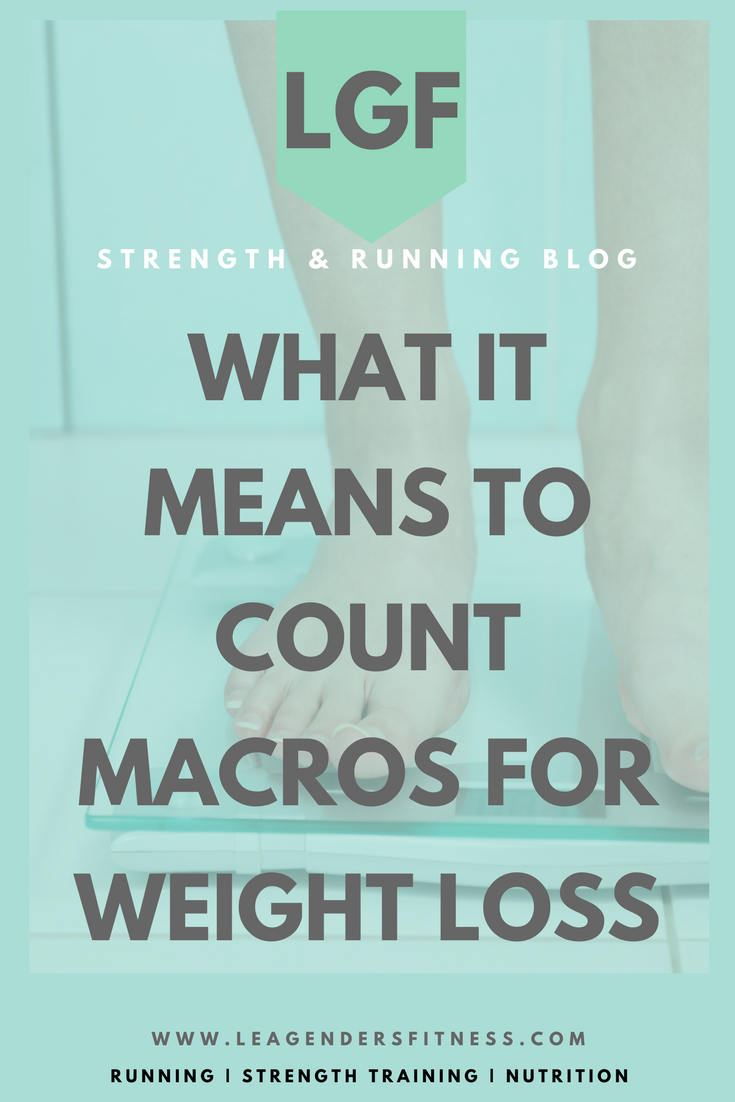Before we can talk about if you should count your macronutrient intake, let me first explain what it means to count your macros. Macros or macronutrients are the fats, proteins, and carbohydrates that make up the calorie content of our food. The foods we eat are made up of some combination of these macronutrients.
This post contains affiliate links which means if you click on a link in this post and make a purchase, I make a percentage of the sale with no additional cost to you. No one is getting rich here, it just helps with the running (pun intended) of this blog. Thanks, as always, for your support.
what it means to count macros for weight loss. Save to your favorite Pinterest fitness board for later.
What Does it Mean to Count Your Macros?
To 'count your macros' means to track the intake of the three major macronutrients: Protein, fat, and carbohydrates.
You can manipulate your calorie intake in order to lose weight or gain muscle mass but with macro counting, you can fine tune your tracking to include where those calories are coming from. Your body may respond differently to the same number of calories with a different macronutrient profile.
Protein has 4 calories per gram
Carbs have 4 calories per gram
Fats have 9 calories per gram
As an example, If you ate a 4 oz grilled steak and 1 medium potato for dinner your calorie intake would be approximately 340 and the macronutrient breakdown of that meal would look like this:
calorie intake screenshot from My Fitness Pal app
macronutrient screenshot from My Fitness Pal
30% of the calories were from carbohydrates, 42% of the calories were from fat and 28% of the calories from protein. There's math involved, but if math isn't your strong suit (like me), you can get help from the free app My Fitness Pal to do the calculations for you. You enter the food you eat and the app calculates the macronutrient breakdown on the nutrition tab. (Word of caution: My Fitness Pal has user-generated data, which means the food data may not always be correct. It's usually better to enter your own foods into MFP even if it's already in the database.)
You can manipulate the macronutrient percentages to achieve different goals. An endurance athlete usually desires a higher carbohydrate percentage, weightlifters often have higher protein requirements and people with weight loss or body composition goals sometimes cycle their carbohydrate or fat percentages.
Generally speaking, most people with fitness goals are in these ranges 30–40% carbohydrates, 30–40% fat, and 30–40% protein.
I like to start with at least 30% protein and manipulate the fats and carbs from there. Some people do better with higher fat and some better with higher carbohydrates. Honestly, there is no way to know without some experimenting. How do you feel when you consume a higher (healthy) fat intake? How does your body respond to higher carbohydrates? Everyone is different. The only way to know is to track and pay attention to how your body responds. How do you look, feel and perform with different intakes?
Why Protein?
I start with protein because we need protein in order to build and maintain muscle. If you are trying to lose weight this is especially important. You want to make sure that as you lose weight you are maintaining your muscle mass. If you consume adequate protein and do some resistance training you can help ensure you lose fat and not muscle.
We want muscle because muscle requires more energy to maintain than fat, which means you burn more calories all day long and your metabolism is higher than if you had less muscle. If you lose muscle when you lose weight you increase the chance that you will gain the weight back.
Protein helps you feel more satisfied between meals and has a higher thermic effect than fats and carbs, which means you burn more calories just to process and digest protein than carbs or fats.
Got it? Protein is good. Choose protein from mostly whole natural sources for the best results. Protein powders are ok to supplement real food but choose whole foods proteins first. Read more in this article that I wrote about protein.
Even if you are not quite ready for macro counting, it's a good idea to at least track your protein intake to make sure you are getting adequate amounts for your goals.
Should I Count My Macros?
Not everyone should count their macros. Macro counting may not be ideal for people who tend to obsess over numbers or the scale. If you start to track everything you eat, it can lead to disordered eating or overwhelm for certain personality types. If you tend to have an all-or-nothing personality, (like me) then detailed tracking can sometimes cause more harm than good. It all comes down to you. If you can track without obsessing, then macro counting is a great tool to reach body composition goals. If you know you have a tendency to go overboard, it may not be the right tool for you, right now.
CAN YOU HELP ME WITH MACROS?
I am a nutrition habits coach which means I help people build healthy sustainable nutrition habits. Often if your diet is not ideal to start, it may not be a good idea to jump to advanced strategies like macronutrient manipulation. You'll make a lot of progress by just cleaning up your diet.
I recommend that most people start with the basics. Some basic healthy nutrition habits include: Eat enough protein, drink enough water, eat 6-8 servings of fruit/vegetables a day, limit processed foods, limit added sugar, stop eating when 80% full, avoid distractions at mealtime and eat slowly. Are you checking off these healthy nutrition habits on a consistent basis? If not, they are a great place to start. Check out this article I wrote called 10 healthy habits that will change your life. If your habits are nailed down and you want to get to the next level, then macronutrient counting or cycling may be a perfect fit for you.
Healthy nutrition habits when cultivated over time can add up to big results. Don't neglect the basics just because it may sound more exciting to count macros. We want results, not excitement. Right?
Choosing to make healthier habits to stick to it long term is one of the most effective weight loss strategies because it changes your lifestyle. If you jump to macro counting before your cover the basics you miss out building the foundation of healthy habits that will help you sustain your weight for the rest of your life. A contractor wouldn't start building a house without a solid foundation first. Building Healthy habits is your foundation, counting macros is the house.
With macro counting, you need to track and measure everything you eat. While this can be a superb tool in the short-term, you probably don't want to count and measure every morsel you eat for the rest of your life. If you have the foundational principles covered most of the time (no one is perfect), then counting your macros could be the next step towards reaching your body composition goals.
Where Can I Get Help?
If you are ready to start counting macros, I'm not your coach for this goal. I prefer to help people with nutrition habits. As a coach, if I spread myself too thin with too many different programs I won't be as effective. I like to focus on my strengths so I can give my clients the best results.
I refer my clients out to a known expert if they are ready for macro counting or cycling. It can be a great tool for people looking to get to the next level. If you're ready, I encourage you to experiment with it. I track my own macros at certain times and have found it effective when I can stick to the numbers. It takes a higher level of commitment and dedication. I am a recovering all-or-nothing thinker so I have to watch myself when it comes to tracking because I know myself well enough to know I can tend to go overboard. I track occasionally to make sure I'm on target for my goals and stop if I start to get too attached to the numbers.
When you're ready, I recommend Cori's Week Macro Cycling Program over at Redefining Strength. I went through the program myself last year and I loved it. Cori gives great information, makes the process easy to follow and understand and offers support throughout the program. Her macro cycling program is affordable and somewhat customizable to your goals. I respect her and encourage my clients and readers to check out all her fitness programs. She's awesome! I only will recommend products and services that I have tried myself with positive results. I know you'll be in great hands with Cori. Click on the below image for more information.
Where are you on your nutritional journey? Are you building the foundation or the house?
Like this post? know someone who may benefit? It helps me when you share with your friends and followers.
















If you have questions about running and weight loss, I’ve rounded up the blog posts to help you with answers. Why do I gain weight during marathon training? What to do when your weight loss plateaus from running. Are you running for performance, or running for weight loss? And why it matters that you choose one. I finish my personal story of how I used running as part of my strategy for permanent fat loss.